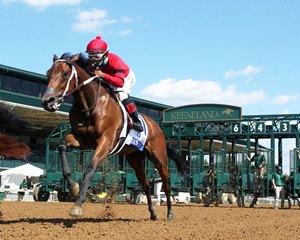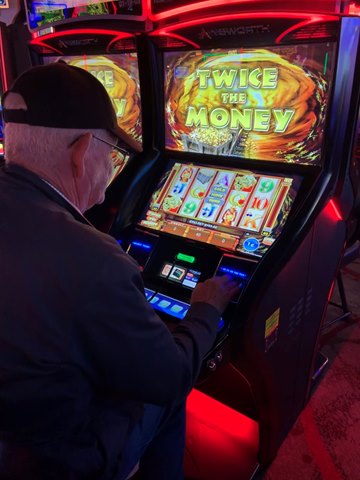Outlook for Kentucky Racing Purses Improves


What a difference a month can make.
When the Kentucky Thoroughbred Development Fund advisory committee met June 3, members were told of the dire straits in which the incentive program found itself.
With the primary KTDF revenue sources negatively impacted by the COVID-19 pandemic, the group that advises the Kentucky Horse Racing Commission was told in June that unless the Historical Horse Racing electronic gaming facilities were permitted to open, the fund would be in jeopardy.
"The bottom line and the fact of the matter is, if we don't get (revenue sources) opened up, this is the last KTDF meeting we need to have," said advisory committee chairman Bill Landes.
The program created in 1978 to benefit Kentucky-sired, Kentucky-foaled runners is funded through a percentage of money wagered on-track, through simulcasting, and HHR gaming going to subsidize purses for qualified runners in certain races.
With tracks allowed to operate without spectators while simulcasting and HHR facilities were closed due to government orders, for a three-month period there was little or no money being generated to replenish the KTDF.
While Churchill Downs was running a delayed spring meet in June, 92% of the handle came from ADW wagering, from which KTDF does not benefit.
Less than a week after that meeting, Kentucky Gov. Andy Beshear issued orders that permitted HHR gaming and simulcasting facilities to reopen with limited capacity and employing other safe practices associated with helping prevent the spread of the coronavirus.
Coupled with the positive handle numbers generated at the Churchill meet and Keeneland's delayed, abbreviated five-day meet in July, and the resumption of HHR wagering, a much brighter picture of the health of the Kentucky racing industry was painted during the Aug. 4 KTDF advisory committee meeting.
Churchill's senior director of finance Tom Minneci reported that during the May 16-June 28 meet, all-sources handle totaled $240.5 million, a 53% increase over the amount wagered for the same period a year ago during the traditional spring meet that began following the week leading up to and including the Kentucky Derby Presented by Woodford Reserve (G1). This year's Derby has been rescheduled to Sept. 5.
Total purses of $15.6 million paid during the meet represented a decrease of $3.7 million.
While the KTDF doesn't receive a portion of ADW wagers, KTDF committee member Doug Hendrickson said about 2.1% of each ADW wager placed on Kentucky races benefits purses at the state's tracks.
Minneci said that once Churchill's Derby City Gaming HHR facility reopened, it averaged $3.8 million daily for the 23 days it was operational in June.
"There was a lot of pent up demand for entertainment and to find things to do and we definitely benefited from that," Minneci said.
With Derby City Gaming reopened, Churchill was approved for up to $1.4 million in KTDF purse supplements for its September meet.
Keeneland's five-day meet in July generated about $64 million in wagering, nearly all through ADW providers, about 32% above the total for the comparable five-day period during the track's traditional spring meet a year ago.
Bob Elliston, Keeneland's vice president of racing, said that due to reduced operating expenses for the racing office and security, the July meet produced $4.5 million, approximately the same amount paid out in purses.
HHR gaming at the joint venture of Keeneland and Red Mile harness racing and gaming facility also saw robust business once it reopened, according to Elliston.

"We did get Red Mile up and running and honestly they've been killing it over there," he said. "Even with a reduced footprint … weekends are packed and we are seeing higher than average numbers during the week because there is not much competition and customers feel safer to come to our facility."
Coupled with a KTDF surplus from the recent meet and the estimated portion of HHR wagering, Keeneland expects to pay about $1.17 million in KTDF purse supplements during the fall meet that will be highlighted by the Breeders' Cup World Championships.
Kentucky Downs, which conducts a boutique all-turf meet and was the pioneer in HHR gaming in Kentucky, was approved to spend $4.9 million in KTDF funds during its meet. In addition, Kentucky Downs will send $1.1 million in KTDF money to help boost purses at the current Ellis Park meet, bringing the total to $2.7 million for KTDF funds at the Henderson track.
While the overall outlook as well as the future of the KTDF purse picture has improved at Kentucky tracks, KTDF committee member J. David Richardson cautioned that the positive numbers could give a distorted picture that the industry can be sustained without spectators.
"What worries me is the perception we are going to be fine and we don't even need live handle," Richardson said. "It is a false economy if we're not careful. With no KTDF (money) from ADW (wagers) and the purse takeout is different with an off-track bet, I think we need to dissuade patrons of the notion it's just as fine for the health of the industry to bet online. That worries me about the future if we ever get coronavirus free."
